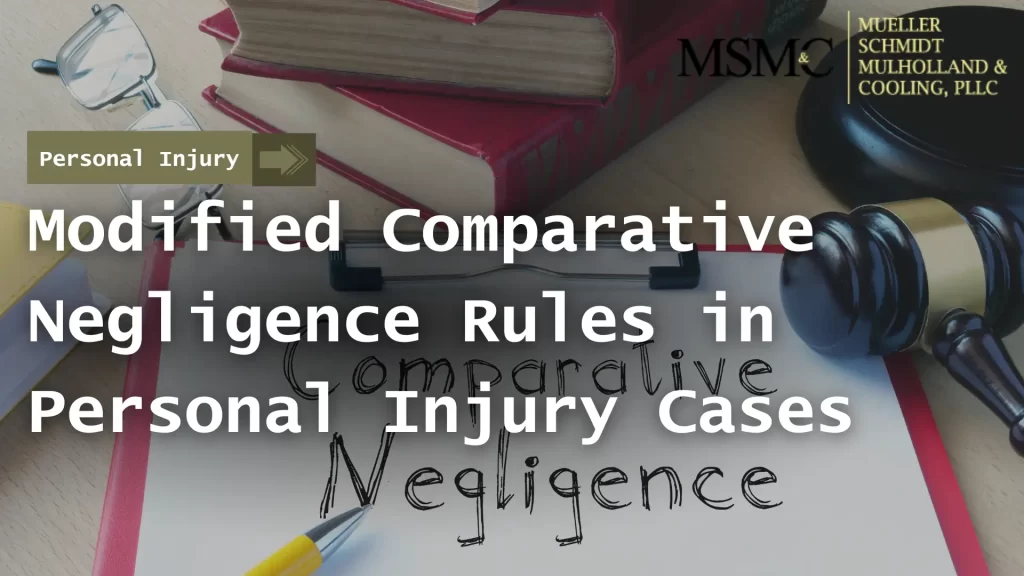
People who suffer injuries due to someone else’s negligence may have a right to compensation for their losses. Determining liability can become complex, however, especially when the injured party shares some responsibility for the incident. In this scenario, the legal concept of modified comparative negligence is utilized. It governs the allocation of fault and damages in personal injury cases.
In Nebraska, like in many other states, this principle is crucial in determining the outcome of personal injury claims. Understanding how it works is essential for both plaintiffs and defendants to effectively navigate the legal process and seek fair compensation or defend against unwarranted claims.
Modified Comparative Negligence
Modified comparative negligence is a principle applied in several states that allows injured parties to recover damages proportional to their share of fault in an accident. Under this rule, plaintiffs can seek compensation if their degree of negligence does not exceed a certain threshold, typically 50% or 51%, depending on the state.
In states following the 50% modified comparative negligence rule, plaintiffs can recover damages if their negligence does not exceed 50% of the total fault. If their negligence exceeds 50%, however, they are barred from recovering any compensation.
On the other hand, in states with a 51% modified comparative negligence rule, plaintiffs can recover damages as long as their negligence does not exceed 51% of the total fault. If their negligence exceeds 51%, they cannot recover any compensation.
Modified Comparative Fault
“Modified comparative fault” is sometimes used interchangeably with “modified comparative negligence.” Both refer to the same principle of apportioning liability and damages based on the relative degree of fault of the involved parties.
While the terminology may vary slightly, the basic concept remains the same. If multiple parties contribute to an accident or injury, each party’s compensation or liability is reduced proportionally to their share of fault.
Modified Comparative Negligence States
As of 2024, several states have adopted some form of modified comparative negligence, including:
- Arkansas
- Colorado
- Georgia
- Idaho
- Kansas
- Maine
- Nebraska
- North Dakota
- Utah
- West Virginia
It is important to note that the specific rules and thresholds can vary from state to state, so it’s crucial to consult a seasoned and compassionate personal injury attorney to understand how these laws apply to your case.
Nebraska Modified Comparative Negligence
Unlike other states that apply pure comparative fault, Nebraska adheres to a 50% modified comparative negligence principle. This principle allows an injured party to seek damages if their contribution to the fault does not exceed 50%. If their contribution surpasses 50%, however, they are barred from receiving any compensation. The duty of care imposed upon you by the contributory negligence or 51 rule states that if your fault percentage is 51 or more at fault, your damages are reduced by that percentage.
If you are partially at fault or have a high percentage of fault, you, as a plaintiff, cannot recover fully the damages awarded to you by the court. A modified comparative negligence example is if a plaintiff is found to be 40% at fault in a car accident and the defendant is 60% at fault, the plaintiff can recover 60% of the total damages from the defendant. Conversely, if the plaintiff’s contribution is determined to be 55%, they would be ineligible for compensation.
Comparative Fault vs. Contributory Negligence

It is essential to distinguish modified comparative negligence from contributory negligence, which a handful of states adhere to. Under the contributory negligence rule, if the plaintiff’s negligence contributed to their injuries in any way, they are entirely barred from recovering damages, regardless of the degree of fault.
In contrast, modified comparative negligence allows for a more equitable distribution of damages. This is based on the relative fault of each party involved. This doctrine recognizes that accidents often result from a combination of factors and aims to apportion liability accordingly. Contributory negligence can lead to harsh outcomes for plaintiffs. In contrast, modified comparative negligence ensures that individuals partially responsible for an accident can still recover damages. Recovery of damages is done in proportion to their degree of fault. This approach promotes fairness and allows injured parties to receive compensation even if they share some responsibility for the incident.
Contact Mueller Schmidt Mulholland & Cooling
If you have suffered injuries due to someone else’s negligence, understand your rights and all of the applicable laws in your state. The legal landscape surrounding personal injury cases can be complex, with nuanced doctrines significantly determining liability and compensation.
At Mueller Schmidt Mulholland & Cooling, our experienced Omaha personal injury attorneys deeply understand these intricate legal principles. Our team is well-versed in handling the complexities of legal doctrines that govern the allocation of damages in personal injury cases.
Don’t hesitate to take the first step towards seeking justice with our personal injury lawyers. Our firm is ready to listen to your story and provide the guidance you need during this challenging time. Contact us today at 402-999-9000 for a free, no-obligation consultation to get the compensation you deserve.
Related Posts:
Categories

Providing Unmatched EXPERIENCE On Your Case When you find yourself in a situation where you’ve been treated unfairly or you’re in the middle of a legal disagreement, it can be difficult to know what your rights are and how to proceed.





